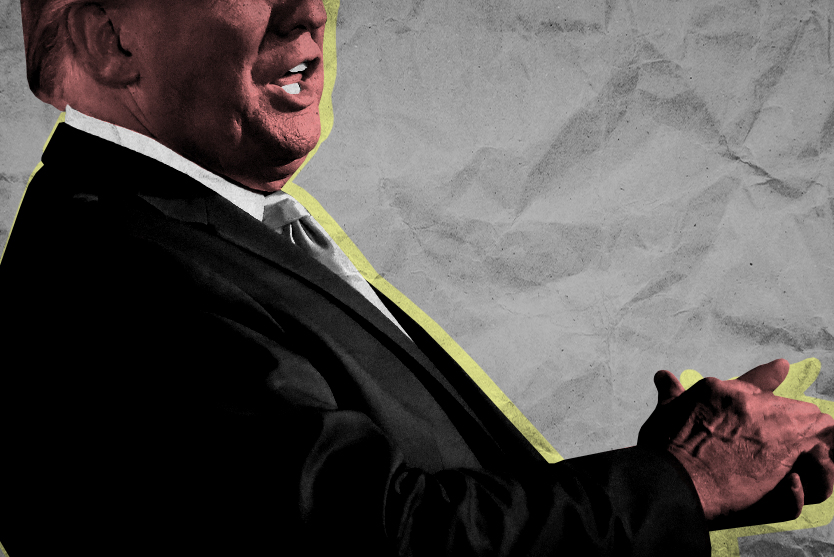Trump's RNC is constantly reminding Americans how he abuses his office


A free daily email with the biggest news stories of the day – and the best features from TheWeek.com
You are now subscribed
Your newsletter sign-up was successful
The Republican National Convention on Tuesday offered plenty of reminders of how thoroughly President Trump has blurred his dual roles as the leader of the United States and the head of the Republican Party.
Trump surprised Jon Ponder, a reformed bank robber, with an Oprah-style on-camera pardon. A small group of immigrants were sworn as new citizens during a brief naturalization ceremony. His Secretary of State, Mike Pompeo, gave a brief speech from Jerusalem — breaking with a long expectation that the nation's chief diplomat stays out of domestic politics. The speech by former Florida Attorney General Pam Bondi, who decried Hunter Biden's involvement with a Ukrainian energy company, revived memories of Trump's attempts to bully that country's president into helping his presidential campaign.
It has rarely been the case in American history that the chief executive was expected to be a completely apolitical figure. George Washington warned of factionalism, but his successors were partisans. Most of those men probably saw some alignment between what was best for the country and what was best for their own interests. There has long been an expectation, however, there would be some distinction between the two roles.
The Week
Escape your echo chamber. Get the facts behind the news, plus analysis from multiple perspectives.

Sign up for The Week's Free Newsletters
From our morning news briefing to a weekly Good News Newsletter, get the best of The Week delivered directly to your inbox.
From our morning news briefing to a weekly Good News Newsletter, get the best of The Week delivered directly to your inbox.
Admittedly, that line hasn't always been strictly observed. The Hatch Act, which prohibits executive branch employees from some political activities, doesn't apply to the president or vice president. Bill Clinton invited scandal by using the Lincoln Bedroom to lure donors. His vice president, Al Gore, drew harsh criticism for soliciting cash from his White House office. Various presidents have shot political ads in the West Wing, but they often drew scrutiny for doing so. The biggest scandals in American political history — including Watergate and Trump's impeachment — stemmed from presidents abusing their official powers to win elections.
"What a White House has to be careful of is that they don't too easily use the tools around them in a way that would be inappropriate," Matt Schlapp, a Republican strategist, told The New York Times in 2012.
Does this White House regard any political activity as inappropriate? Judging by this year's RNC, it seems not.
A free daily email with the biggest news stories of the day – and the best features from TheWeek.com
Joel Mathis is a writer with 30 years of newspaper and online journalism experience. His work also regularly appears in National Geographic and The Kansas City Star. His awards include best online commentary at the Online News Association and (twice) at the City and Regional Magazine Association.
-
 How the FCC’s ‘equal time’ rule works
How the FCC’s ‘equal time’ rule worksIn the Spotlight The law is at the heart of the Colbert-CBS conflict
-
 What is the endgame in the DHS shutdown?
What is the endgame in the DHS shutdown?Today’s Big Question Democrats want to rein in ICE’s immigration crackdown
-
 ‘Poor time management isn’t just an inconvenience’
‘Poor time management isn’t just an inconvenience’Instant Opinion Opinion, comment and editorials of the day
-
 Big-time money squabbles: the conflict over California’s proposed billionaire tax
Big-time money squabbles: the conflict over California’s proposed billionaire taxTalking Points Californians worth more than $1.1 billion would pay a one-time 5% tax
-
 Did Alex Pretti’s killing open a GOP rift on guns?
Did Alex Pretti’s killing open a GOP rift on guns?Talking Points Second Amendment groups push back on the White House narrative
-
 Washington grapples with ICE’s growing footprint — and future
Washington grapples with ICE’s growing footprint — and futureTALKING POINTS The deadly provocations of federal officers in Minnesota have put ICE back in the national spotlight
-
 Trump’s Greenland ambitions push NATO to the edge
Trump’s Greenland ambitions push NATO to the edgeTalking Points The military alliance is facing its worst-ever crisis
-
 Why is Trump threatening defense firms?
Why is Trump threatening defense firms?Talking Points CEO pay and stock buybacks will be restricted
-
 The billionaires’ wealth tax: a catastrophe for California?
The billionaires’ wealth tax: a catastrophe for California?Talking Point Peter Thiel and Larry Page preparing to change state residency
-
 Trump considers giving Ukraine a security guarantee
Trump considers giving Ukraine a security guaranteeTalking Points Zelenskyy says it is a requirement for peace. Will Putin go along?
-
 Bari Weiss’ ‘60 Minutes’ scandal is about more than one report
Bari Weiss’ ‘60 Minutes’ scandal is about more than one reportIN THE SPOTLIGHT By blocking an approved segment on a controversial prison holding US deportees in El Salvador, the editor-in-chief of CBS News has become the main story
